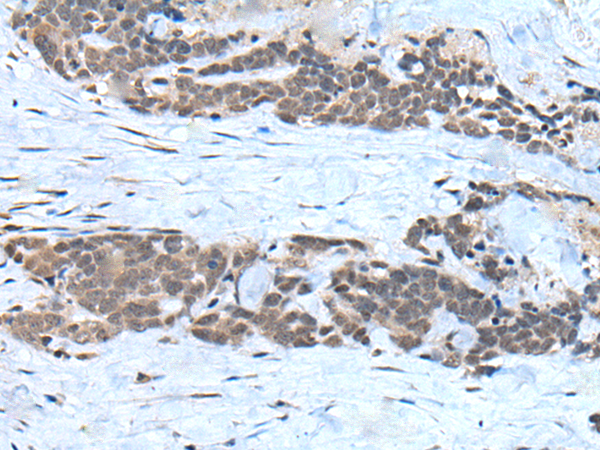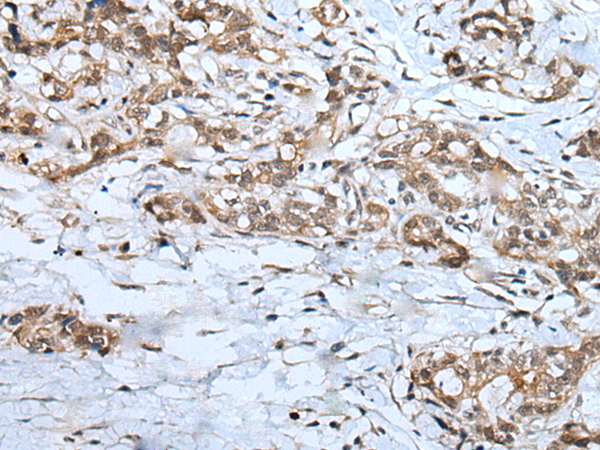

| WB | 咨询技术 | Human,Mouse,Rat |
| IF | 咨询技术 | Human,Mouse,Rat |
| IHC | 1/20-1/100 | Human,Mouse,Rat |
| ICC | 技术咨询 | Human,Mouse,Rat |
| FCM | 咨询技术 | Human,Mouse,Rat |
| Elisa | 1/5000-1/10000 | Human,Mouse,Rat |
| Aliases | UBP; SIH003 |
| Host/Isotype | Rabbit IgG |
| Antibody Type | Primary antibody |
| Storage | Store at 4°C short term. Aliquot and store at -20°C long term. Avoid freeze/thaw cycles. |
| Species Reactivity | Human, Mouse |
| Immunogen | Fusion protein of human USP3 |
| Formulation | Purified antibody in PBS with 0.05% sodium azide and 50% glycerol. |
+ +
以下是关于USP3抗体的3篇代表性文献的简要信息:
---
1. **文献名称**:*USP3 regulates genome integrity and cancer development through deubiquitinating RPA*
**作者**:Nicassio, F. et al.
**摘要**:该研究揭示了USP3通过去泛素化复制蛋白A(RPA)在DNA损伤修复中的作用,利用特异性USP3抗体验证其在细胞核内的定位,并证明其缺陷导致基因组不稳定性和肿瘤易感性增加。
---
2. **文献名称**:*The deubiquitinating enzyme USP3 stabilizes Aurora B to promote progression of mitosis*
**作者**:Zhu, Y. et al.
**摘要**:研究发现USP3通过稳定Aurora B激酶调控有丝分裂进程,实验中使用USP3抗体进行免疫共沉淀(Co-IP)和Western blot分析,证实其与Aurora B的相互作用及功能关联。
---
3. **文献名称**:*USP3 modulates the chromatin status of homologous recombination repair genes through histone H2B deubiquitination*
**作者**:Zhang, L. et al.
**摘要**:该文献提出USP3通过去泛素化组蛋白H2B调控染色质可及性,促进同源重组修复。研究利用USP3抗体进行ChIP-seq分析,揭示了其在表观遗传调控中的新机制。
---
以上文献均通过USP3抗体进行蛋白功能验证,涵盖其在DNA修复、细胞周期及表观遗传中的关键作用。如需具体DOI或期刊信息,可进一步补充检索关键词(如年份或期刊名称)。
The USP3 antibody targets ubiquitin-specific protease 3 (USP3), a deubiquitinating enzyme (DUB) belonging to the ubiquitin-specific protease family. USP3 plays a critical role in maintaining genomic stability by regulating DNA repair, chromatin remodeling, and cell cycle progression. It catalyzes the removal of ubiquitin chains from substrates, counteracting ubiquitin-mediated signaling. Research highlights its involvement in modulating key pathways, including the DNA damage response (DDR) via interactions with proteins like γH2AX and RAD51. as well as regulating NF-κB signaling by deubiquitinating TRAF proteins. USP3 is also implicated in cancer, where its dysregulation may influence tumor progression, metastasis, and chemoresistance.
Antibodies against USP3 are widely used in research to study its expression, localization, and molecular functions. They enable techniques like Western blotting, immunofluorescence, and co-immunoprecipitation to explore USP3’s role in cellular processes and disease contexts. Studies using USP3 antibodies have revealed its nuclear localization and overexpression in certain cancers, suggesting its potential as a therapeutic target. Recent work also links USP3 to viral infection responses and immune regulation. However, challenges remain in fully characterizing its substrate specificity and context-dependent roles. Commercially available USP3 antibodies vary in specificity, requiring validation via knockout controls to ensure reliability in experimental settings.
×